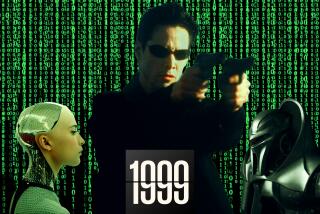Desire is irrelevant. I am a machine.
“No fate.” It’s from a movie. To be exact, it’s from “Terminator 2: Judgment Day,” the huge 1991 vehicle for future California Gov. Arnold Schwarzenegger. If you know your Terminator lore, you know that this sequel took the evil Terminator from the original flick and made him good. Same Arnold-as-cyborg-from-the-future, same sunglasses and black leather jacket, same catch phrases (“I’ll be back”). But suddenly he was a protector rather than an evil killer. This was a guy who might be running for office some day.
He was sent back through time to protect the future savior of humankind, a little boy named John Connor. Connor’s mother, played by a tough and buff Linda Hamilton, had carved the words “no fate” onto a picnic table. Her kid saw the words and put the pieces together: It was short for “No fate but what we make for ourselves.” It was an upbeat message not just for John Connor but for American moviegoers struggling with a post-Cold-War recession. The future is in your hands. You’re not stuck with anything pre-determined. Do something.
“Terminator 2” doesn’t have much in common with “Lawrence of Arabia,” but its “no fate” message does evoke a famous bit of anti-determinism declared by a robed Peter O’Toole after he pulls from the desert a man who had been given up for dead. A Bedouin tribesman had told Lawrence not to bother with the lost man, as death was his fate: “It is written.” The triumphant hero, returning from his rescue mission, shocks and stirs the warriors with his words: “Nothing is written.”
I can get behind that. I’ve never been much of a Terminator fan, and in fact when Schwarzenegger was cruising to victory in the 2003 recall, I thought we were getting a political anti-hero who embodied the original Terminator. The vengeful destroyer, bent on tearing apart Sacramento bureaucrats and politicians and California’s progressive traditions. But by the time of his 2006 reelection, I not only had caught up on my video rentals, but I was also paying attention to the pro-growth, pro-environment, post-partisan message California’s governor was carrying. His character in “Terminator 2” put it a bit more roughly: “Come with me if you want to live.” But OK. I want to live. I’m coming with you.
If only I’d kept up with my movies, I’d have known that all that stuff about writing our own future was a bunch of hooey. I know that now. Watching Arnold Schwarzenegger deliver the State of the State address earlier this month essentially throwing in the towel on recapturing our government from blind initiatives and ballot-box budgeting I came to realize that we are now firmly in the “T3” phase of Arnold’s governorship.
Stay with me for a moment. I didn’t get around to watching “Terminator 3: Rise of the Machines,” until it hit AMC seemingly every night last year. I should have checked it out sooner, because the movie was intimately linked with the 2003 recall campaign. My colleague Joe Mathews ably chronicles the interplay of Arnold’s “T3” promotional campaign and his political career in the perfectly named 2006 book, “The People’s Machine: Arnold Schwarzenegger and the Rise of Blockbuster Democracy.” Schwarzenegger might otherwise have challenged a weak and unpopular Gray Davis in the 2002 election, Mathews writes, but was committed to completing and marketing “T3.”
He instead pushed a ballot initiative. Proposition 49 earmarked money for after-school programs. Like a bevy of predecessor measures Proposition 98 (1988), which compels spending for schools and eliminates lawmakers’ discretion over nearly half the budget; Proposition 42 (2002), which siphons sales tax on gasoline from the budget and directs its spending on transportation, to name just two Prop. 49 was a pet project that eliminated human decision-making from much of the annual budget process. It left the governor and the Legislature with an auto-pilot budget. The budget machine, made up of several decades’ worth of ballot measures, decided how to spend money. Elected officials lost their discretion, and along with it their accountability.
Prop. 49 passed on Nov. 5, 2002, the same day Davis was reelected governor. Mathews notes that Schwarzenegger talked about election day as if it were a movie opening. “November 5,” Mathews quotes Arnold as saying, “is judgment day.”
“T3” opened the following July, when recall fervor against Davis was building. “If it’s possible to pinpoint the exact moment when California’s direct democracy and the business of blockbuster moviemaking merged fully into a new political force,” Mathews writes, “Fourth of July weekend was it.”
In “T3,” the good Terminator is replaced by a bad Terminator who has been reprogrammed to be a good Terminator. Sort of. Sure, he’s a protector, but next to the really nasty T-X model (Kristanna Loken) sent from even further in the future, he’s a weakling. He vacillates.
And about all that “no fate but what we make” stuff? Forget it. They were just joshin’. An older John Connor (Nick Stahl) meets up with Claire Danes, and Arnold tells them they are fated to marry. There are worse fates, but still. You kind of want to be able to choose your own spouse. Connor goes through the movie planning to prevent Judgment Day, when the machines take over, but at the end he realizes he had less power over the future than he thought.
“I should have realized it was never our destiny to stop Judgment Day,” Connor says, as the nuclear weapons begin to fall. “It was merely to survive it. Together. The Terminator knew; he tried to tell us, but I didn’t want to hear it. Maybe the future has been written.”
Great. We are about to be destroyed by the machines we made, and there’s not a thing we can do about it. Come to think of it, in “Lawrence of Arabia,” O’Toole ended up having to execute the man he carried out of the desert. The poor soul must have been fated to die, one way or the other. “It was written, then,” another Bedouin notes with a shrug.
Maybe it’s because of budget problems, maybe because the realities of Sacramento politics are finally hitting home, or maybe it’s that being governor is no fun anymore. One way or another, it has been the weary, deterministic, Terminator 3 model of Gov. Arnold Schwarzenegger we have seen so far this year. Any hope that he will lead us out of the problems into which we’ve plunged ourselves Proposition 98, Proposition 42, and all the rest of the ballot-box budgeting measures was in vain. Our governor wants to take the budget away from the humans and turn it over to the machines.
Taking his fiscal lead from Arkansas Arkansas! Schwarzenegger wants a system in which “excess” revenue would be snatched from lawmakers and automatically put into some fund for the future. Not enough revenues? No human decisions, please. Schwarzenegger’s Arkansas system would automatically strip money from the budget across the board.
“So you don’t have to fight when it happens,” the governor explained recently to The Times editorial board. “You don’t have to sit down and use it for a political weapon. Automatically in Arkansas, they have a system in place so that if the money goes down you know which programs get cut, and if it goes down further other programs get cut, and if the revenues go down even further or longer, you have other programs that get cut. So you have a three-tiered program, and I think that’s the best way to go. Because that means no more fights.”
No more fights? Really? Since when was that the goal? Politics is all about fighting, making up, agreeing, and fighting again. It’s a contest of policy choices, and of power. It’s the reason Californians sent the Terminator to Sacramento to fight.
My colleague, columnist George Skelton, outlined very clearly in a recent piece that the governor of California has more control over spending than most executives. Even with all those auto-pilot spending mandates we voters foist on Sacramento, the governor has the ability to slash spending and mandate saving for the future if he has the guts to confront the Legislature. “The governor and the Legislature have all the power they need right now,” Skelton wrote, “except for the willpower.”
But Schwarzenegger is telling us that willpower is just too hard to exert. No more fights. No human factor. No budget discretion, no accountability.
It’s the rise of the budget machine, and our Terminator wants us to believe it can’t be stopped. No, the budget won’t ever become self-aware, like Skynet in the Terminator movies. But it could still destroy us.
I hold out hope that the governor can be reprogrammed again, and return us to the “T2” era of thinking. No fate but what we make. It’s worth noting that the very popular “Terminator: The Sarah Connor Chronicles” TV series is set back in the time before “Terminator 3.” A touch of nostalgia, perhaps. And they seem to get along without Arnold Schwarzenegger.
Robert Greene is a member of The Times editorial board.
Send us your thoughts at opinionla@latimes.com.More to Read
A cure for the common opinion
Get thought-provoking perspectives with our weekly newsletter.
You may occasionally receive promotional content from the Los Angeles Times.











